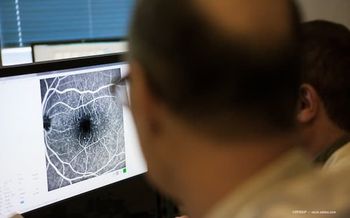
Study reports potential recurrent uveitis after COVID-19 vaccination in patients with a uveitis history
The almost 474,000 participants in the study had been diagnosed with uveitis between January 1, 2015, and February 25, 2021 in South Korea.
Physicians are advised to be alert to the potential for recurrent uveitis following vaccination for COVID-19 in patients who previously had uveitis,1 according to Jiyeong Kim, PhD; Hyeon Yoon Kwon, MD; and Seong Joon Ahn, MD, PhD. Kim is from the Department of Pre-Medicine, College of Medicine, and Biostatistics Lab, Medical Research Collaborating Center, Hanyang University, while Kwon and Joon Ahn are from the Department of Ophthalmology, Hanyang University Hospital, Hanyang University College of Medicine, both in Seoul, Korea.
All patients included in this retrospective, population-based cohort study had been diagnosed with uveitis between January 1, 2015, and February 25, 2021, in South Korea, and all had a history of uveitis and had received at least 1 dose of a messenger RNA (mRNA) (BNT162b2, Pfizer-BioNTech; or mRNA-1273, Moderna) or adenovirus vector-based (ChAdOx1, AstraZeneca; or Ad26.COV2.S Janssen) COVID-19 vaccine. The participants’ demographic and clinical data and vaccination details were retrieved from the Korean National Health Insurance Service and Korea Disease Control and Prevention Agency databases.
The main study outcomes were the incidence and risk of post-vaccination uveitis associated with different COVID-19 vaccines and periods before and after COVID-19 vaccination. Uveitis was categorized by the time of onset (early, within 30 days, or delayed) and type (anterior or non-anterior), the investigators recounted.
Data analysis
The authors reported that 543,737 individuals had a history of uveitis, and of those, 473,934 individuals (mean age, 58.9 years) had received COVID-19 vaccinations and were included in the data analysis.
“The cumulative incidence rates of post-vaccination uveitis were 8.6% at 3 months, 12.5% at 6 months, and 16.8% at 1 year, predominantly of the anterior type. Variations in the risk of post-vaccination uveitis were observed across different vaccines and inter-vaccination periods,” the investigators reported.
The analysis showed that the risk of development of early postvaccination uveitis increased for individuals treated as follows: BNT162b2 (hazard ratio [HR], 1.68; 95% confidence interval [CI}, 1.52-1.86), mRNA-1273 (HR, 1.51; 95% CI, 1.21-1.89), ChAdOx1 (HR, 1.60; 95% CI, 1.43-1.79), and Ad26.COV2.S (HR, 2.07; 95% CI, 1.40-3.07).
“The risk of uveitis was higher particularly between the first and second vaccination doses (HR, 1.64; 95% CI, 1.55-1.73),” they pointed out.
The results suggested that there is elevated risk of development of uveitis after COVID-19 vaccination, with the vaccine type and period mediating this risk. The investigators advised that in patients with a history of uveitis, clinicians should consider the potential risk of uveitis recurrence in vaccination strategies and clinical monitoring.
Reference:
Kim J, Kwon HY, Ahn SJ. COVID-19 vaccine–associated uveitis in patients with a history of uveitis. JAMA Ophthalmol. Published online April 25, 2024; doi:10.1001/jamaophthalmol.2024.0973
Newsletter
Keep your retina practice on the forefront—subscribe for expert analysis and emerging trends in retinal disease management.





























